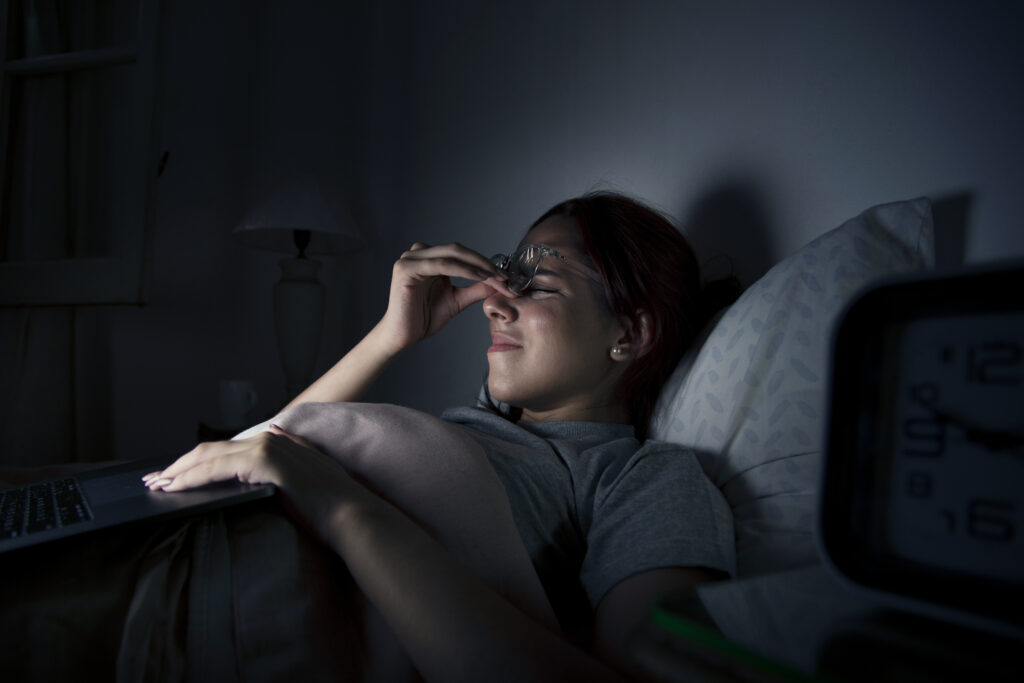
Image source: freepik
Nighttime anxiety and poor sleep often go together. In 2024, the American Psychiatric Association reported that almost half of United States adults felt more anxious than the year before. Stress and problems with sleep were main reasons for this rise. About sixty-one percent worry about paying bills. Fifty-nine percent worry about their health. These worries tend to get stronger at night and can keep people from sleeping well.
Simple Practices That Target Nighttime Stress
Deep breathing works for many people. One method is called the 4-7-8 technique. You inhale through your nose for four seconds, hold your breath for seven seconds, and exhale through your mouth for eight seconds. Research shows that using this approach slows the heart and lowers the stress hormone cortisol. This helps the body relax and get ready for sleep.
Progressive muscle relaxation is another option. This involves tensing and relaxing each muscle group, starting at the feet and moving upward. Recent research shows that people who do this before bed fall asleep faster and feel less anxious. Some studies found it shortens the time to fall asleep by up to thirty percent.
Grounding exercises help distract the mind from worry. The 5-4-3-2-1 method is a popular strategy. You look around and name five things you can see, four things you can touch, three things you can hear, two things you can smell, and one thing you can taste. This pulls your focus into the present and away from anxious thoughts.
Finding Calm Through Natural Supports:
Exploring Natural Aids for Calming Nighttime Anxiety
Some people find comfort in natural aids before bed. Herbal teas like chamomile and valerian root are popular for their relaxing effects, and lavender sprays are used in many bedrooms for calm. Interest in CBD gummies for nighttime rest has grown alongside melatonin and magnesium supplements. Scientific reviews and user reports highlight these options as gentle ways to encourage sleep.
These approaches do not work for everyone, but surveys and clinical studies suggest they can be a safe addition to routines. It is always best to check safety and quality when adding any new supplement.
Weighted Blankets and the Science of Pressure
More therapists recommend weighted blankets. Peer-reviewed research from 2023 and 2024 found that blankets weighing about ten to fifteen percent of the user’s body weight help in several ways. They increase serotonin and melatonin, which support relaxation and sleep. They also lower cortisol. People in these studies had less anxiety at night and slept better, with sleep quality scores improving by over twenty percent. The gentle, steady pressure seems to help users feel safe and settled, which is useful for those with steady worry or tension.
Controlling Your Sleep Setting: Simple Adjustments
How you set up your bedroom matters. The National Sleep Foundation says keeping rooms dark, quiet, and cool helps. Using blackout curtains, white noise or soft earplugs, and setting the temperature between about sixty and sixty-seven degrees Fahrenheit are standard tips. Most experts also warn against using screens close to bedtime since blue light interrupts melatonin production.
Building a Consistent Bedtime Routine
Keeping to the same bedtime and wake time every day helps the body prepare for sleep. Experts recommend calming activities for at least half an hour before bed. These can include reading a printed book, taking a warm bath, or doing gentle stretching. These simple routines help train the brain to expect rest.
Clinical Methods Backed by Data
Cognitive behavioral therapy remains the main method recommended for anxiety-related sleep trouble. This therapy teaches you to spot anxious thoughts and replace them with realistic, calming versions. For example, you might note worries about not sleeping and remind yourself of times you managed before. Journaling can be helpful. People who write out their worries or a short list of tasks before bed fall asleep faster.
Other approaches proven by research include mindfulness meditation, guided imagery, and slow movement activities such as tai chi or qigong. These practices control anxious thoughts and lower physical tension.
Therapists also advise setting aside some time earlier in the evening for worry. This “worry window” allows you to write down stresses or concerns, then set them aside for the rest of the night. Accepting anxious thoughts without fighting them (“I notice I am worried, but I do not have to act on it now”) can stop thoughts from spiraling at bedtime.
Everyday Choices That Make a Difference
Avoid caffeine for at least six hours before sleeping. Reducing alcohol also helps since alcohol breaks up sleep and can increase anxious feelings. Daytime exercise, even if light, can lower daily stress and promote better sleep at night, as long as it finishes several hours before bed. Many people also find comfort in calming scents like lavender or chamomile, which gentle studies suggest can promote relaxation.
When to Seek Extra Help
If none of these methods improve anxiety or sleep, professional help can make a difference. In 2024, more people spoke to mental health professionals than in previous years. The American Psychiatric Association’s data shows that twenty-eight percent of adults did this in the past year, showing that support is available and used. There are many ways to address anxiety, including talk therapy and medication when needed.
Evidence Points to Practical Steps
The best strategies are based on scientific research and professional advice as of July 2025. Trying several of these tips and paying attention to which ones help can make nights less stressful and sleep more restful. Regular effort and patience matter, as improvements can take some time, especially when breaking habits related to worry at night. There is strong support for each option here from sleep research and mental health authorities.
